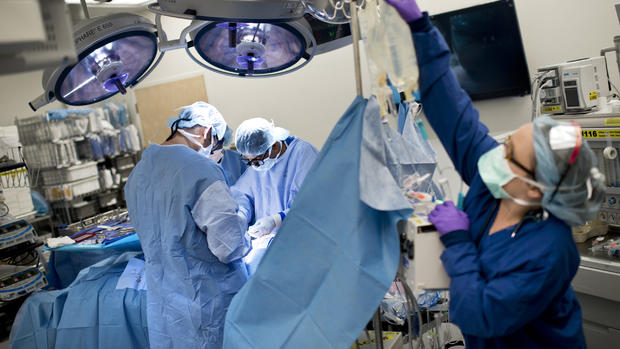How much should a hip replacement cost? Study raises more questions than answers
Medical costs may vary depending on the hospital that provides treatment, and a new study shows just how much they can vary.
Researchers conducted a "secret shopper" study in search of a total hip replacement at two randomly-selected hospitals from each state and Washington D.C., in addition to 20 of the best orthopedic hospitals in the country. They found prices can range from $11,100 to almost $126,000 for the same procedure. That is, if the hospital would even provide researchers with a price quote.
"There have been many initiatives to increase pricing transparency, including state and federal laws, and still many hospitals are unable to provide price information for a common procedure," study author Jaime Rosenthal, a researcher at the University of Iowa Carver College of Medicine in Iowa City, said in a press release. "Also, the variation in pricing was striking, as we tried to give each hospital identical information in terms of what the procedure would require."
For the study, researchers randomly called two hospitals from each U.S. state between May 2011 and July 2012, in addition to calling the top 20 orthopedic hospitals as ranked by U.S. News and World Report. Using a script, they asked for the lowest "bundled price" for an elective total hip replacement for the caller's 62-year-old uninsured grandmother. Each hospital was contacted up to five times and in the cases a hospital would only provide associated hospital costs instead of surgical costs, researchers randomly contacted orthopedic surgery clinics affiliated with the hospitals.
The findings were published Feb. 11 in JAMA Internal Medicine.
The researchers found only nine of the top ranked hospitals and 10 of the non-top-ranked hospitals were able to give complete price quotes. At top-ranked hospitals the prices ranged from $12,500 to $105,000 and at non-top-ranked hospitals that provided quotes, prices ranged from $11,100 to $125,798.
"We believe that our results highlight the reality that hospitals have a very hard time knowing their own prices," study co-author Dr. Peter Cram, director of internal medicine at Carver College of Medicine, said in a statement.
- Outrage after Croatian child reportedly charged $837,000 by U.S. hospital for cancer treatment
- Retiree medical expense study is a shocker
Researchers were able to obtain a total of 64 price quotes from the 102-non-ranked hospitals, but with the exception of those 10, they had to call both the hospital and surgeon's practice to price together a quote. Twenty-two of the non-ranked hospitals were able to give partial prices, and 16 could not give any price whatsoever. The study did not look specifically about what factors made a hospital more likely to give a full quote, but the data showed hospitals in the Midwest were more likely to provide a price quote and those in the Northeast were less likely.
Common reasons given by hospital representatives for not being able to provide a price included that the patient has to see a physician first, the hospital has a policy preventing staffers from giving quotes over the phone, or that the staffer had no way to provide such an estimate.
"Our calls to hospitals were often greeted by uncertainty and confusion by the hospital representatives about how to assist us," the researchers added. "We were frequently transferred between departments, asked to leave messages that were rarely returned, and told that prices could not be estimated without an office visit... It is sobering to compare our experience with the best practices we have come to expect from other service industries."
The researchers wrote that the $100,000 variation they found in quotes suggests savvy customers may be able to find cheaper care, while less-savvy ones could pay "exorbitantly high prices." They note the rise of the medical tourism industry in recent years may reflect the demand from consumers seeking better value for their health care dollars.
In an accompanying editorial published in the same issue of JAMA Internal Medicine, Dr. Ezekial Emanuel and Andrew Steinmetz of the department of medical ethics and health policy at the University of Pennsylvania's Perelman School of Medicine, compared the current cost situation to that of the 1950's American automobile industry. Back then, a buyer may not know the full price of a new car until after committing to purchase it, and shipping charges and phony fees were often added. With the help of independent consumer evaluations for quality and the passage of new policies, such as mandating a sticker on new cars that contains the manufacturer's suggested retail price, the industry improved, they wrote.
Emanuel and Steinmetz are calling for more transparency and polices that develop "all-in prices" for various medical procedures. They add that these prices offer almost no value in the absence of quality measures such as data on infection rates or six-month redo rates. Otherwise consumers and other health care decision makers may not know whether a low price represents a good value or shoddy medical care.
"Health care today suffers from the same sickness that plagued the auto industry a half-century ago --except the situation in health care is even worse," wrote the researchers. "It is time we stop forcing people to buy health care services blindfolded -- and then blame them for not seeing."
